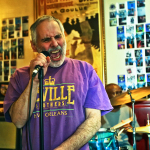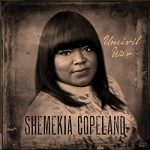[E]very morning, pursuing the idea of staying alive as long as possible, I do about 20-30 minutes of exercise. In order to make this more palatable, having just emerged from my musician’s coma, I have some of my favorite records playing.
At the moment, my selection includes Booker T. & the MG’s’ classic Hip Hug-Her and Thelonious Monk’s Brilliant Corners. And in these sad days since the passing of my colleague and friend, Jack Bruce, both of these records remind me of him.
Jack loved Duck Dunn, the MG’s’ bassist, and you can hear hints of Jack’s eventual style in some of the slurs and blue notes Dunn plays, as well as in some of the dirtier textures and the precise but powerful drive. Stand-up bass-wise, Jack was a Mingus man, but I know he also loved the wonderful Oscar Pettiford, who plays on Brilliant Corners. Many of Jack’s compositions were directly related to what he learned harmonically from Monk, about whom Jack and I even wrote a song, “Laughing on Music Street.”
I first became friendly with Jack when he was with Alexis Korner’s Blues Incorporated. He was sharing an apartment with trombonist John Mumford, who was part of the New Departures jazz and poetry group that I was in. For a while, the New Departures group had a residency on Tuesdays at London’s Marquee Club and Alexis always had the Thursdays. We would be allowed in free to these always crowded sessions, which I loved dancing to.
When Graham Bond, who was also with Alexis, got a trio gig under his own name with Jack and Ginger Baker, it went so well that he decided to extract them from Alexis’ band. To complete the lineup, Graham first recruited John McLaughlin, then, when Ginger made John leave, Dick Heckstall-Smith, who had remained with Alexis in the meantime.
Thus was born the Graham Bond Organisation, one of Britain’s greatest bands. And Jack, who had been relegated to background vocals with Alexis, got to sing some lead, even on the first GBO record. Graham was always generous.
Then, not long after Ginger fired Jack from GBO too, there was Cream. You might say I got to know Jack better during Cream, but that would hardly be true. There wasn’t time. Cream was on the road constantly, being a big cash cow, and the management was too mean to send me out with Jack to write. So there were some moments snatched during brief lulls between tours. Luckily, Jack and I were fast and made the best of what we had, and the chemistry between us rarely failed.
However, at the beginning, there was also the problem of me having had a bad drug/alcohol experience and stopping (forever, it turned out) all the things I thought sustained me. But I got through it. After “I Feel Free” (our one and only almost pop song), the next step was Disraeli Gears—real fame for Cream and some real bucks for me.
During Cream, Jack and I wrote several songs—“Theme for an Imaginary Western” and “Weird of Hermiston” included—that were demoed but rejected by the management as unsuitable (these demos were “lost”). Those songs formed the basis of Jack’s first solo record, Songs for a Tailor. It was obvious by then that we had become a team and would remain so, though we never thought it would go on for over 40 more years.
I would be involved with many of Jack’s subsequent projects, from the almost-commercial West, Bruce & Laing to the supreme artistic achievement of Lifetime. Sadly, the latter had its own self-destruct mechanism in the form of no less than three managers. The one Lifetime gig that I attended, in the unsuitable London Speakeasy club, was one of the best I’ve ever been to. West, Bruce & Laing had some moments, too, especially on record: the apocalyptic “Like a Plate” (“plate” is British slang for blowjob), and the huge emotional impact of “Out Into the Fields.” The second BLT (Jack, Bill Lordan and Robin Trower) record, Truce, was notable for “Thin Ice,” which should have been a hit, and the atmospheric “Last train to the Stars.”
In 1974, I came to America (for the first time) to work with Jack on what would become Out of the Storm. It was a difficult record, with LA’s Record Plant besieged by drugs and dealers, and the final vestiges of ’60s freedoms gone sour and trying to die. LA was still a playground, and that took its toll too. But I loved the girls and the pink grapefruits and of course the record shops. When we came back to Britain, Jack and I nearly drowned in a boating accident in Scotland. We returned to London somewhat sobered to finish the album.
Jack required more and more dedication to his projects, which I couldn’t always provide. I had my own life as a poet/singer/bandleader/producer/screenwriter and couldn’t always just drop things. Sometimes I think he was angry with me for being clean and not able to share his nightmares, though we shared a lot of other things including the same angry, left-wing politics. We also loved much of the same music: Monk, Mingus, Messiaen, Ellington, Coltrane, Otis Redding and the great blues singers. However, I had a lot less time for Bob Dylan than he did.
We were both very much into the writing of Malcolm Lowry, who we’d been turned onto by Dick Heckstall-Smith. Furthermore, I have always loved Scotland and the Scots and virtually all of my major artistic collaborators, including Jack, have been Celtic in origin. My wife is Scottish too.
Jack and I carried on, off and on, until this year, when Jack’s final record, Silver Rails, came out. There had been a gap before that, but when Jack asked me to do it, I was happy. It was a good experience and I’m very proud of it. I think he knew it was going to be his last record.
Phil Ryan, my longtime music partner, has always said that Jack and I produced a unique body of work that should be better appreciated. I’m not going to disagree with that. Most of Jack’s solo records, his best work, never sold. So I hope he gains more recognition in the future. It’s never too late for that.
In a lot of the postmortem press, there has been a feeling that Jack’s heyday or pinnacle was reached with Cream, and, after that, everything was downhill. I can’t agree. The Graham Bond Organisation was a better band, albeit without international success—Lifetime was the same, much later. Jack was young with Cream, and would go on to perform and write infinitely better. Even at the Cream reunion in 2005, they all played better than they used to; they’d matured so much, and modern technology actually enabled them to hear each other properly for the first time and respond accordingly.
Cream was early success, and a huge career boost. But for me—and, I suspect, Jack—it was never about the money. It’s always good to make a decent living, but comfort can lead to complacency and that’s not what we were about.
I loved Jack for his great talent, and sometimes as a man. I was privileged to have worked with him for so long. His passing will leave a huge gap in the music world, and in my life.
– Pete Brown

After rising to the top of the British beat poetry scene of the early ’60s, Pete Brown branched out into the music world, where (in addition to his copious work with Jack Bruce) he led groups like Pete Brown and his Battered Ornaments, Piblokto and the Interoceters. In recent years, Brown has, beyond his work in screenwriting and film production, devoted his time to his latest band, Psoulchedelia.
All photos by Arnold Goodman










Be the first to comment!